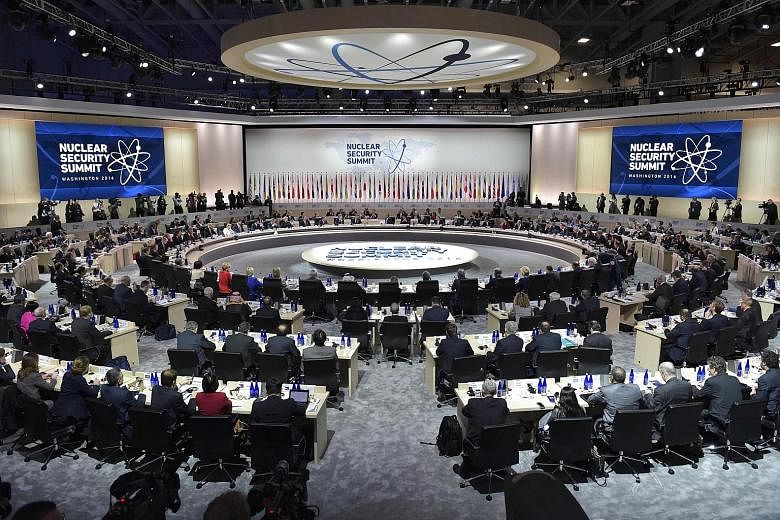World leaders at the Nuclear Security Summit in Washington have reaffirmed their commitment to countering nuclear terrorism and proliferation, with the budding nuclear ambitions of the Islamic State in Iraq and Syria (ISIS) militant group topping the list of concerns.
In a joint communique released after the summit on Friday, the more than 50 leaders highlighted nuclear terrorism as "one of the greatest challenges to international security" and pledged to cooperate to combat it.
"More work remains to be done to prevent non-state actors from obtaining nuclear and other radioactive materials, which could be used for malicious purposes. We commit to fostering a peaceful and stable international environment by reducing the threat of nuclear terrorism and strengthening nuclear security," the communique said.
Speaking at the first plenary session of the day, Prime Minister Lee Hsien Loong said that while it was not the most imminent threat - no terror group has yet obtained a nuclear device - it was a "plausible and believable" one. He cited an article published in an ISIS magazine last year which highlighted a scenario where ISIS purchased a nuclear device from the black market to launch a major attack. "It shows their intent, and it is a threat which countries must take seriously."
He also outlined Singapore's efforts to minimise the threat, including stringent border checks. "The things we are going to do, we need to do anyway," he told Singapore media after the summit. "That is to deal with the ideology of extremist groups, deal with the operational aspects of it, to identify the people before they can do anything... The nuclear part of it is something we are working on with other countries so when it comes to tracking the movement of material through Singapore, we have been doing our part."
In his speech at the plenary session, Chinese President Xi Jinping urged nations to further strengthen the global nuclear security architecture. "It is necessary to assess the international nuclear terrorism situation on a regular basis," he said. "We must build international consensus on enhanced nuclear security."
In opening the event, US President Barack Obama warned: "There is no doubt that if these madmen ever got their hands on a nuclear bomb or nuclear material, they most certainly would use it to kill as many innocent people as possible," he said. "It would change our world."
The summit took place amid growing fears of nuclear terrorism. In the weeks leading up to the summit, it was discovered individuals involved in the Paris and Brussels attacks had filmed a senior manager working at a Belgian nuclear facility.
And though the summit - an initiative of the Obama administration - will likely be the last, the group laid out action plans for organisations like the UN and Interpol.
Said Dutch Prime Minister Mark Rutte: "This summit is not the end of our quest to make the world safe from nuclear terrorism. The five organisations to which we pass the torch today can count on our continued support and commitment."
PM Lee, who is concluding a week-long working visit to the US, had meetings with leaders on the sidelines of the summit, including Mr Rutte, Thai Prime Minister Prayut Chan-o-cha and Malaysian deputy premier Ahmad Zahid Hamidi. The Prime Minister's Office said the Thai PM has accepted an invitation to deliver the Shangri-La Dialogue keynote speech in Singapore this year.

